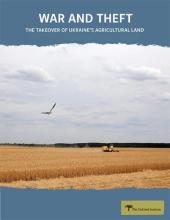Land Library Search
Through our robust search engine, you can search for any item of the over 73,000 highly curated resources in the Land Library.
If you would like to find an overview of what is possible, feel free to peruse the Search Guide.
/ library resources
Showing items 1 through 9 of 592.Produite dans le cadre de l’école de chercheurs organisée au Sénégal par IPAR, le pôle foncier de Montpellier et l’Université Gaston Berger avec l’appui du CTFD, cette fiche pédagogique fait le point sur les instruments directs et indirects qui peuvent être mobilisés pour réguler les marchés fonc
Despite the existence of a legal framework defining the right to fair compensation, and notwithstanding the vast literature on transnational and domestic land deals, no theory has been developed so far to allow for a specific analysis of the economics of fair compensation in large-scale land acqu
War and Theft: The Takeover of Ukraine’s Agricultural Land, exposes the financial interests and the dynamics at play leading to further concentration of land and finance.
Despite the progress made in terms of global and national land policy frameworks, effective changes in practices remain limited.
The land rush has remained, and is likely to remain, a significant global phenomenon despite waning international media attention. The scope of the phenomenon is likely to be wider than previously thought.
Context and background Land grabbing has been in the news in Africa in recent years. Fertile land is increasingly falling into the hands of national or international private investors.
Cette étude est le troisième volet d’une série consacrée à l’accès à la terre, thématique centrale du programme 2017-2021 d’Entraide et Fraternité.
A 22 minute video about one of the biggest cases of agricultural land grabbing in Senegal: 20,000 hectares;first allocated to Senhuile-Sénéthanol;now known as Les Fermes de la Téranga.
L’acquisition de larges superficies de terres arables dans les pays en développement pour y effectuer des investissements a pris forme et ampleur au Sénégal en 2000 avec l’avènement des réformes dans le secteur agricole.









